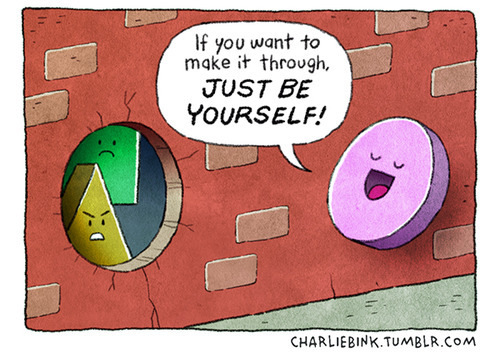I definitely connected this reading to SCWAAMP. The first
bullet in SCWAAMP is Straightness. Personally I always grew up thinking a man
and a women are the only people that get together. Not because I didn’t believe
it was right, but because I was never exposed to anything else because of
SCWAAMP. The only books that I read were heterosexual love stories. The typical
family was only on TV. Now there are shows like The Fosters and Modern Family
that are open about the LGBT community.
For my blog post I decided to answer the first set of questions that were
included in the piece. I thought these questions were very important for the
reader to answer in their minds in order to connect to the piece rather than
just reading it.
My old high school recently became very involved in LGBT equality because there were many bullying incidents. The administration had a no tolerance policy, but it wasn’t until recently that sexual orientation was put in bold. Now I have three openly gay friends and multiple gay family members. I am totally comfortable with those of the LGBT community.
My old high school recently became very involved in LGBT equality because there were many bullying incidents. The administration had a no tolerance policy, but it wasn’t until recently that sexual orientation was put in bold. Now I have three openly gay friends and multiple gay family members. I am totally comfortable with those of the LGBT community.
What
messages did you receive about the LGBT community when you were in school?
Did you ever question these messages? Do you talk to the youth in your life about what they are learning in the LGBT community in your curriculum?
Growing up, people used to throw around derogatory terms that are directed at the gay community like they were nothing. This always made me very uncomfortable. I heard it constantly in the hallways. Whenever any of my friends said it I would correct them and pretty much flip out on them. But in school I never heard much about the LGBT community until middle school when one of my friends came out to me and my eyes really opened to how the world reacts. Once I went into high school a group of students started an equality group. This was unfortunately constantly made fun of by a prominent group in my school who were with lack of a better term complete and utter jerks. Children in my life are not educated much in school about the LGBT community. I know they are at home, so I do not need to step in but I believe that the children in my life are more accepting of it than the adults are and I think that's sad.
Growing up, people used to throw around derogatory terms that are directed at the gay community like they were nothing. This always made me very uncomfortable. I heard it constantly in the hallways. Whenever any of my friends said it I would correct them and pretty much flip out on them. But in school I never heard much about the LGBT community until middle school when one of my friends came out to me and my eyes really opened to how the world reacts. Once I went into high school a group of students started an equality group. This was unfortunately constantly made fun of by a prominent group in my school who were with lack of a better term complete and utter jerks. Children in my life are not educated much in school about the LGBT community. I know they are at home, so I do not need to step in but I believe that the children in my life are more accepting of it than the adults are and I think that's sad.
I honestly do not know anything at all about the gay rights movement. I feel pretty awful about that and I’m going to definitely research it. I think that says a lot about the school system. The only movement that I learned about were the women’s rights movements (only in college) and the civil rights movement (since elementary school). I feel that this is an important topic to discuss in schools and I am surprised that it was not discussed with me before.


